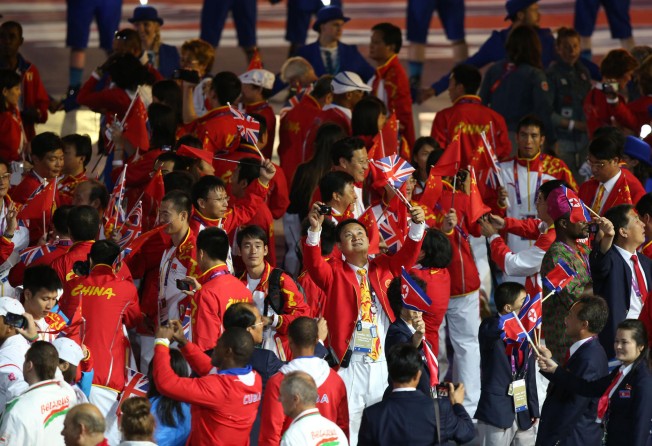China reflects after London Olympics, sees tough road to Rio
Delegation chief says there's a lot of work to do before 2016, after a tumultuous Games in which the team's performance was 'satisfactory'

China's sports mandarins had warned before the London Games that their athletes would struggle to match the table-topping gold medal haul they enjoyed in Beijing. They will take little comfort in being proved right.
China amassed 38 gold medals in London to reaffirm its status as a sporting superpower but finished behind the Americans, who take 46 titles back to the United States.
Reeled in by the US athletics team in the final days, China, which won 51 golds at Beijing, immediately spoke of plans to improve its "regular" performance.
London was at times a tumultuous Games for the Chinese delegation. They were angered by suspicions of doping in their swimming programme, dragged into scandal by their badminton team and stunned by the second successive Olympic failure of Liu Xiang.
China has long regarded Olympic success as going hand in hand with economic clout and global influence, and delegation chief Liu Peng said the team had a lot of work to do before the 2016 Rio Games and to "enlarge its international impact".
Liu, who described the performance as "satisfactory", said other countries were catching up with China in sports like table tennis, badminton, diving, gymnastics and weightlifting, while the Chinese were not making enough progress in other sports.
"In track and field, swimming, cycling and other events we have achieved obvious progress but there is still quite a big gap between us and the strong sporting nations," Liu said.
"Although we played well in our traditional best disciplines and events, other countries are catching up quite rapidly and we are facing more severe challenges.
"We need to reflect carefully on these problems and learn more and make a bigger effort to improve … We know we have a lot more work to do and our task is still very huge."
Mainland newspapers yesterday largely brushed aside any worries about the medal tally.
The People's Daily lauded the athletes' performance as the result of "scientific training, solid preparation and tenacious hard work".
But sister paper the Global Times said most Chinese were not upset at coming second this time around. "Few Chinese really support the idea of winning gold medals at any price," it wrote in an editorial.
Liu, who has a history of playing down expectations, said there were eight events in London in which China won gold medals for the first time and the team improved markedly in swimming, winning five golds compared with one in Beijing.
But a series of doping cases in the 1990s have overshadowed China's achievements in the pool over the past decade and cast a pall over young swimmers Sun Yang and Ye Shiwen at London.
Sun, 20, became China's first male Olympic swimming champion after winning the 400 metres freestyle, then obliterated his own world record to win the 1,500m freestyle, becoming the first man in 32 years to bag the distance double.
Ye, 16, shaved five seconds off her personal best to win the 400m individual medley with a world record time, then won the 200m individual medley, but her joy was tempered by suspicions of doping aired by an American swimming coach in the British media.
Liu described China's performance in its traditional strengths as "regular", sweeping all four golds in table tennis for the second successive Games and winning six out of eight diving titles.
Their five-gold sweep of the badminton tournament was overshadowed by the expulsion of their world champion women's doubles pair Yu Yang and Wang Xiaoli.
The Chinese and three other pairs from the South Korean and Indonesian teams were disqualified for deliberately playing to lose their matches to secure a more favourable position in the tournament's knockout phase.
With allegations of poor sportsmanship dogging the team, other Chinese teams slammed officials they felt had cost them certain gold medals. The team's gymnastics head coach fumed at judges when retiring Beijing champion Chen Yibing missed out on the rings gold medal, while the track cycling team demanded a review of a relegation that cost their women the team sprint gold.
Far more galling for the Chinese, however, was Liu Xiang's stunning failure in the 110m hurdles.
China's first man to win a track gold medal at the 2004 Athens Games, Liu clattered into the first hurdle of his opening heat in a haunting echo of his ill-fated Beijing title defence. The sight of the trailblazer sprawled on the track was hardly inspiring to his track and field teammates, and the athletics team won just one gold through Chen Ding, who won the men's 20km walk in a world record time.
China's gold medal hauls in the traditionally strong gymnastics, shooting and weightlifting events were down on their Beijing totals, which will prompt some soul-searching over the effectiveness of the country's Soviet-style sports system.
Chinese bloggers have expressed concerns about damaged athletes crashing under the pressure to win gold after sacrificing their childhoods for the state. This was highlighted when it was revealed that diving gold medallist Wu Minxia was not told of her grandparents' deaths or her mother's battle with cancer, fearing it would distract her.
"The system is disastrous," wrote one user on China's Twitter-like microblogging service Sina Weibo.
"The budding young talents are shut up in closed training schools from a young age and apart from their own events, almost have no other life skills."